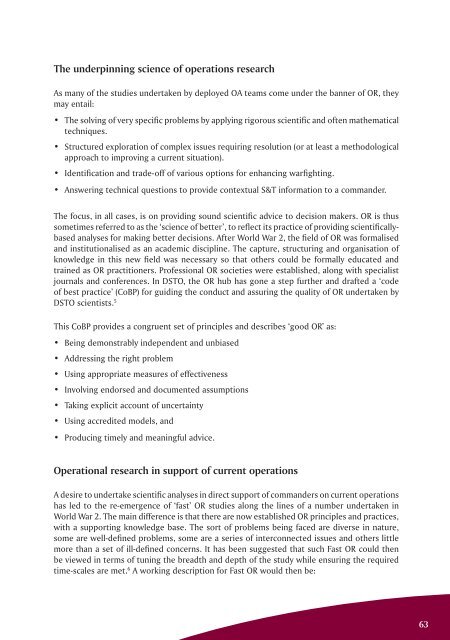ISSUE 182 : Jul/Aug - 2010 - Australian Defence Force Journal
ISSUE 182 : Jul/Aug - 2010 - Australian Defence Force Journal
ISSUE 182 : Jul/Aug - 2010 - Australian Defence Force Journal
Create successful ePaper yourself
Turn your PDF publications into a flip-book with our unique Google optimized e-Paper software.
The underpinning science of operations researchAs many of the studies undertaken by deployed OA teams come under the banner of OR, theymay entail:• The solving of very specific problems by applying rigorous scientific and often mathematicaltechniques.• Structured exploration of complex issues requiring resolution (or at least a methodologicalapproach to improving a current situation).• Identification and trade-off of various options for enhancing warfighting.• Answering technical questions to provide contextual S&T information to a commander.The focus, in all cases, is on providing sound scientific advice to decision makers. OR is thussometimes referred to as the ‘science of better’, to reflect its practice of providing scientificallybasedanalyses for making better decisions. After World War 2, the field of OR was formalisedand institutionalised as an academic discipline. The capture, structuring and organisation ofknowledge in this new field was necessary so that others could be formally educated andtrained as OR practitioners. Professional OR societies were established, along with specialistjournals and conferences. In DSTO, the OR hub has gone a step further and drafted a ‘codeof best practice’ (CoBP) for guiding the conduct and assuring the quality of OR undertaken byDSTO scientists. 5This CoBP provides a congruent set of principles and describes ‘good OR’ as:• Being demonstrably independent and unbiased• Addressing the right problem• Using appropriate measures of effectiveness• Involving endorsed and documented assumptions• Taking explicit account of uncertainty• Using accredited models, and• Producing timely and meaningful advice.Operational research in support of current operationsA desire to undertake scientific analyses in direct support of commanders on current operationshas led to the re-emergence of ‘fast’ OR studies along the lines of a number undertaken inWorld War 2. The main difference is that there are now established OR principles and practices,with a supporting knowledge base. The sort of problems being faced are diverse in nature,some are well-defined problems, some are a series of interconnected issues and others littlemore than a set of ill-defined concerns. It has been suggested that such Fast OR could thenbe viewed in terms of tuning the breadth and depth of the study while ensuring the requiredtime-scales are met. 6 A working description for Fast OR would then be:63

















